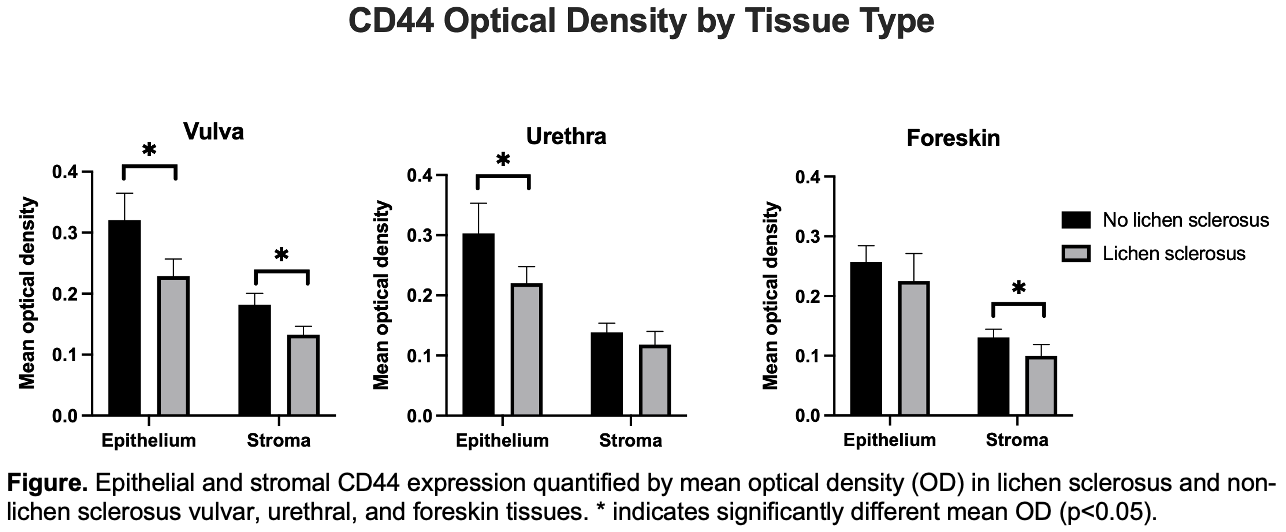Back
Poster, Podium & Video Sessions
Moderated Poster
MP07: Bladder & Urethra: Anatomy, Physiology & Pharmacology
MP07-08: CD44 Expression is Reduced in Lichen Sclerosus
Friday, May 13, 2022
10:30 AM – 11:45 AM
Location: Room 228
Ali Ghasemzadeh*, Brian Walczak, Chad Vezina, Wade Bushman, Wei Huang, Matthew Grimes, Madison, WI

Ali Ghasemzadeh, MD, PhD (he/him/his)
Urology Resident
Poster Presenter(s)
Introduction: Lichen sclerosus (LS) is a chronic inflammatory disease of the genital epithelium which causes severe fibrosis of the vulva and foreskin and urethral stricture disease refractory to conventional treatment in affected men. The pathogenesis of LS is unknown, limiting development of novel treatments. Reduced expression of CD44, a cell surface receptor involved in epithelial barrier function, has been observed in vulvar LS but has not been characterized in other tissues. Hyaluronic acid (HA), the principal ligand of CD44, is a major component of the extracellular matrix, interacts with multiple immune modulators and is involved in chronic inflammation and fibrosis. Based on this, we hypothesize that epithelial CD44 expression is decreased and HA abundance increased in human LS tissues compared to non-LS tissues.
Methods: Human vulvar, urethral, and foreskin tissues were obtained after either circumcision, urethroplasty (male patients) or vulvar biopsy (female patients) and reviewed with a genitourinary pathologist to determine LS status. CD44 expression and HA abundance were quantified using immunohistochemistry. Three 20x regions of interest (ROIs) were selected per slide in a blinded fashion. Vectra and In Form image analysis software was used to segment tissues into epithelial and stromal compartments and quantify staining as mean optical density (OD) in each ROI which were compared using the Student’s T-test with respect to tissue type and LS status.
Results: CD44 and HA staining was compared between tissue sections from 23 LS patients (vulva n=9, urethra n=7, foreskin n=7) and 29 non-LS patients (vulva n=9, urethra n=7, foreskin n=13). In vulva, CD44 OD was significantly reduced in both epithelium and stroma. In urethra, epithelial CD44 OD was significantly reduced and stromal expression unchanged. In foreskin epithelial CD44 OD was similar and stromal OD reduced (Figure). HA abundance was similar in all tissues with respect to LS status.
Conclusions: CD44 loss appears to be a prominent feature of LS. HA abundance however is unchanged compared to controls. This finding suggests that a functional defect in epithelial barrier regulation and CD44/HA interaction may underlie the chronic inflammation, fibrosis and immune dysregulation seen LS. Further study may provide therapeutic targets for these patients.
Source of Funding: NIH/NIDDK Grant K12DK100022

Methods: Human vulvar, urethral, and foreskin tissues were obtained after either circumcision, urethroplasty (male patients) or vulvar biopsy (female patients) and reviewed with a genitourinary pathologist to determine LS status. CD44 expression and HA abundance were quantified using immunohistochemistry. Three 20x regions of interest (ROIs) were selected per slide in a blinded fashion. Vectra and In Form image analysis software was used to segment tissues into epithelial and stromal compartments and quantify staining as mean optical density (OD) in each ROI which were compared using the Student’s T-test with respect to tissue type and LS status.
Results: CD44 and HA staining was compared between tissue sections from 23 LS patients (vulva n=9, urethra n=7, foreskin n=7) and 29 non-LS patients (vulva n=9, urethra n=7, foreskin n=13). In vulva, CD44 OD was significantly reduced in both epithelium and stroma. In urethra, epithelial CD44 OD was significantly reduced and stromal expression unchanged. In foreskin epithelial CD44 OD was similar and stromal OD reduced (Figure). HA abundance was similar in all tissues with respect to LS status.
Conclusions: CD44 loss appears to be a prominent feature of LS. HA abundance however is unchanged compared to controls. This finding suggests that a functional defect in epithelial barrier regulation and CD44/HA interaction may underlie the chronic inflammation, fibrosis and immune dysregulation seen LS. Further study may provide therapeutic targets for these patients.
Source of Funding: NIH/NIDDK Grant K12DK100022


.jpg)
.jpg)